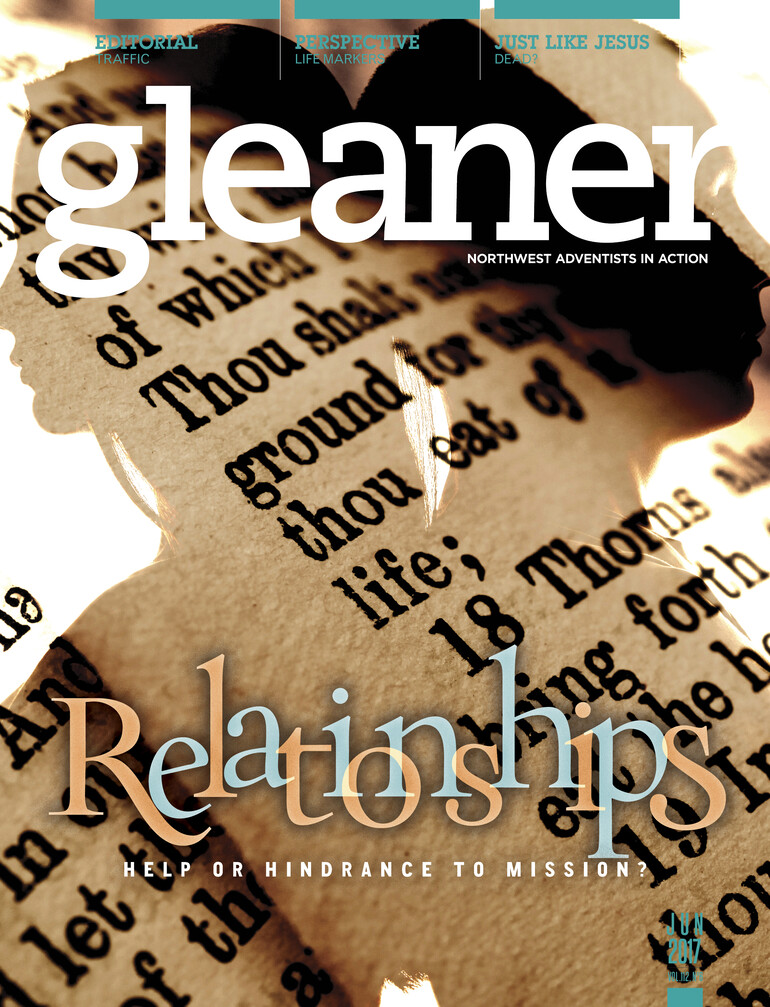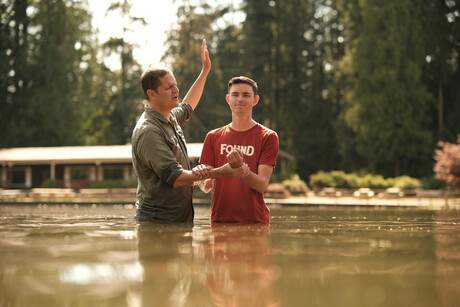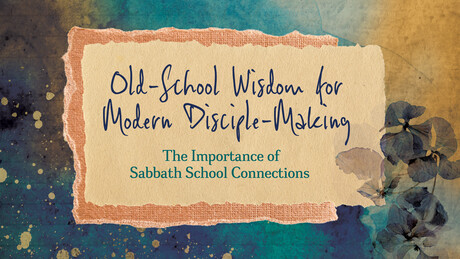God created us in His image to crave positive relationships. When we build on those relationships to lead others to Jesus, we find that truth often flourishes best when placed in the context of human connections. But making friends for Christ is no guarantee all will go well.
Friendship Evangelism Gone Bad
We had just undergone a major family transition and had moved into a neighborhood with young families where we met Bob and Lucy. One day God opened an opportunity for us to assist them with some marital challenges, and our friendship naturally deepened.
Several months later, Bob, Lucy and their children accepted Jesus as their personal Savior and were baptized into our church. We can still remember that glorious Sabbath morning. The whole family exuberantly entered the baptismal waters and exited with uncontainable, tear-stained joy. Lucy shared she had found everything she didn’t even know she was looking for.
Another positive friendship-evangelism story? It was for a while, until unfortunate events and attitudes put on the brakes.
Lucy’s Story
You see, Lucy was battle-scarred. As a young girl, she had developed an inescapable familiarity with rejection, neglect, abuse and heartache. Lucy and her family, like the grand majority of us post-fall humans, were wounded by generations of unhealthy family systems that failed to provide consistent unconditional love, a sense of belonging, attention and affection. When they were exposed to the good news of the gospel, when they experienced unconditional love and acceptance in our friendship, they assumed that the church community that followed Jesus would reflect Him and His character.
And all seemed to be going well, until an ill-fated Sabbath morning. At the potluck following church, our “holier-than-thou” sister Sarah approached Lucy and began to harshly criticize the “inappropriate” dish Lucy had brought. It wasn’t just that Sarah had assigned herself as the sergeant of the “potluck police force," but it was the calloused, ruthless way she discharged her scathing public rebuke that seemed to annul everything we had taught Lucy about Jesus’ compassionate response toward sinners.
So Lucy turned and left that day, stunned by the penetrating sting of shame with which she was all too familiar. Our church was the one place she had hoped things would be different. Despite our deepest apologies and best efforts to re-explain that not all church attending members are mature Christians, Lucy never returned to church.
How Did We Get Here?
Family scientists have suggested it takes several generations to produce a schizophrenic. Unhealthy relationships in one generation often worsen in the next. Scripture explains the sins of the fathers will reach their children until the fourth generation. We are all products of our inherited family system patterns that have played out after the fall.
Our sinful nature is dangerous because sin, which is self-focused, is all about hurting, resenting, hating, destroying and deforming. Sin follows the pattern of its designer. “The thief,” Jesus said, “comes to steal, kill and destroy” (John 10:10).
Sandra Wilson, in her book Hurt People Hurt People, reminds us that the family system patterns we carry within ourselves accompany us to church (and everywhere we go). We end up hurting each other due to the often unidentified and inescapable pain in our own lives.
Individuals who have grown up in homes lacking unconditional love, attention and affection sometimes have difficulties loving others unconditionally and giving attention to their own spouses or children. They can struggle to give or receive affection.
When a person has grown up in a home filled with constant put downs, criticism and other forms of emotional abuse, we can predict they will have a very difficult time creating emotional intimacy in a romantic relationship. How can a person who has experienced such a toxic environment be expected to automatically trust another enough to be vulnerable, transparent and authentic? The unhealthy family system patterns have created a person who instinctively distrusts, creates protective barriers to protect against intimacy, and harbors pain and resentment that can inadvertently be transmitted to their relationships.
Genetically Wired for Relationship
Positive relationships are critical to learn because they are part of God’s character of love. Adam was created in the image of God. God the Father lives in connection with the Son, who lives in connection with the Spirit. Relational connection is not merely a theoretical concept. It is a way of life for the Trinity. Eve was later formed from Adam’s rib, and the couple was commanded to become one flesh. Oneness connection was to be a way of life for all married couples.
Sin, however, changed the heart condition from an “other-focus” to a “self-focus.” Our capacity to love and receive love from another became challenging.
When Jesus was deployed to Earth, His assigned name proclaimed His relationship intentions: Immanuel, “God with us.” Jesus came to personally model for all of humanity, how living in unbroken connection with His Father was the secret to living above the emotional smog of distress, disillusionment and destruction that living disconnected lives engenders.
When two of John the Baptist’s disciples followed Jesus one day, He suddenly turned around and asked them, “What are you looking for?”
They responded, “Where are you staying?” (John 1:37, 38). Jesus could have said, “I live in a house on Main and Broadway or next to the market.” Instead, He seized the opportunity to connect with these two men and invited them: “Come and see.”
The Word then tells us that the two disciples stayed with Him the rest of the day. Relational connections make us feel included. Inclusion builds relationships; exclusion destroys them. Exclusion hurts; inclusion enhances. Exclusion devalues; inclusion esteems. Exclusion is punitive; inclusion is redemptive.
So How Do We Make a New Start?
First, let’s accept that there are no perfect family relationships after the fall in Eden. A more realistic ambition is to strive for healthy (enriching and connecting) versus unhealthy (destructive and disconnecting) family relationship patterns. Our delusions of perfection can only serve to fuel the self-righteous degradation (private or public backbiting gossip) of all others who fail to measure up to our self-imposed standards.
In our opening story, we saw how Sarah’s relentless perfectionism fueled her heartless rebuke towards Lucy. You might have guessed by now that Sarah, much like Lucy, also came from an unhealthy family system. The one primary difference between Sarah and Lucy was Lucy was very aware of her unhealthy upbringing while Sarah hid the truth from herself and others by covering up her “true self” with her self-righteous “false self.” Though hidden, Sarah’s inner shame and pain fueled her to speak and behave in a cruel manner toward anyone she felt deserved to be put in their place.
Second, our family relationship patterns are embedded into who we are, how we view others, how we listen and how we respond in any given situation. It’s why Jesus, during His nighttime encounter with Nicodemus, emphasized the need that all humans must start all over again. Jesus directed Nicodemus to understand that a child of God needs to begin with an infusion of the Holy Spirit. In the new birth experience, the Spirit literally recreates the person in a complete overhaul so that what was, no longer is. “Behold,” explains Paul, “everything is made new” (2 Corinthians 5:17).
Ellen White explains, "The religion of Christ transforms the heart. It makes the worldly-minded man heavenly-minded. Under its influence the selfish person becomes unselfish because this is the character of Christ. Dishonest, scheming persons become upright so it is second nature to them to do unto others as they would have others do unto them. The immoral man or woman is changed from impurity to purity. They form correct habits, for the gospel of Christ has become to them a savor of life unto life” (Testimonies for the Church, vol. 5, page 345, emphasis added).
If we have perceived God’s invitation to grow and mature emotionally and spiritually into mission-focused individuals, families and spiritual communities, we can begin by humbling ourselves. We can prayerfully ask God to aid us in identifying and categorizing our core family relationship patterns as either healthy or unhealthy. Next, we must hold these up to the relational standards Christ exemplified during His time on Earth.
As maturing adults, we can then determine which family relationship patterns are constructive and which are destructive. We must choose those worthy of retaining and passing forward to our children. We must discard anything counterproductive to our collective goal of creating the emotional connections necessary for building thriving relationships with God, our spouses, children, church family and anyone in our circle of influence.
Uplifting Relationships Are Not Optional
As members of the body of Christ, relating to one another in uplifting ways is not optional. We are encouraged by Paul’s words: “And let us not grow weary while doing good, for in due season we shall reap if we do not lose heart. Therefore, as we have the opportunity, let us do good to all, especially to those who are of the household of faith” (Galatians 6:9, 10, NKJV).
White echoes this: “We sustain a most solemn relation one to another. Our influence is always either for or against the salvation of souls. We are either gathering with Christ or scattering abroad. We should walk humbly and make straight paths, lest we turn others out of the right way” (Review and Herald, March 27, 1888).
Here are several things to remember as we seek to build positive relationships within our homes, churches and communities:
- We need to accept the reality that we need healing for our broken and distorted spiritual and emotional condition. Self-deception runs deep and wide in our society.
- It is not theoretical knowledge we need so much as spiritual regeneration.
- Healthy relationships are based on the participation of open, transparent, authentic individuals who are vulnerable and sensitive to Jesus love and therefore willing to share that love.
- Every day we are presented with opportunities to help somebody feel included, valued, appreciated. This might be a simple nonverbal acknowledgement of somebody’s presence, a smile, a warm look, an encouraging word, and invitation to “come and see” by opening the doors of our homes, our hearts or anything that communicates care and sympathy for others.
- Relationships, especially marriage and family relationships, are God’s laboratory for character growth. This family laboratory includes the relationships we are called to develop and sustain with our brothers and sisters in the body of Christ. In fact, it is God’s intentional plan to allow us to relate to people who are very different than us in temperament, background and personality. This is one of the most effective methods God uses to grow and mature His children into His likeness. God has gifted us with marriage partners, children, and/or spiritual brothers and sisters whom He is using as His “assistants” in the growth and development of our characters. It is God’s agenda that we grow and mature into His image as we relate to one another in home, church and community in ways that reflect His work in our lives.
Additional Resources
Additional reousrces are available here.
César and Carolann De León are licensed marriage and family therapists who give seminars around the world.











